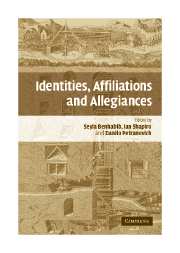Book contents
- Frontmatter
- Contents
- List of figures
- List of tables
- List of contributors
- Editors' introduction
- Part I Emergence and limits of national political identities
- 1 From affiliation to affinity: citizenship in the transition from empire to the nation-state
- 2 Transnationalizing the public sphere: on the legitimacy and efficacy of public opinion in a post Westphalian world
- 3 “Being there”: place, territory, and identity
- 4 Political boundaries in a multilevel democracy
- Part II Multiple identities in practice: the European example
- Part III Decoupling citizenship from identity
- Part IV Identity and historical injustice
- References
- Index
1 - From affiliation to affinity: citizenship in the transition from empire to the nation-state
Published online by Cambridge University Press: 05 June 2012
- Frontmatter
- Contents
- List of figures
- List of tables
- List of contributors
- Editors' introduction
- Part I Emergence and limits of national political identities
- 1 From affiliation to affinity: citizenship in the transition from empire to the nation-state
- 2 Transnationalizing the public sphere: on the legitimacy and efficacy of public opinion in a post Westphalian world
- 3 “Being there”: place, territory, and identity
- 4 Political boundaries in a multilevel democracy
- Part II Multiple identities in practice: the European example
- Part III Decoupling citizenship from identity
- Part IV Identity and historical injustice
- References
- Index
Summary
In Weber we can discern three kinds of “ideal-types”: the definitional (Status, class, power), the conceptual (Patrimonial authority, bureaucracy), and the historical (Roman Empire). Definitional is based on naming, defining a particular mode of action, or the identification of one aspect of a social behavior. Conceptual is a logical construct which is in all probability never found in full in empirical reality. It is a logical construct, perhaps forcing the empirical, the lived, to constantly approximate it. The third, the historical, refers to a historical case whose internal logic, its innate grammar, is best intuited and its manifestations are related to that innate logic although it is probably never fully, empirically, evinced; it governs all aspects of that particular historical formation, gives direction to its motions, and sets its cultural map. Here Weber gives the experiences of the Augustan and the Caesarian periods, and identifies the Augustan as core of the Roman Empire and Caesar's as a violation. This I take as a bone fide essentialist position in the original use of that term. I will take the same approach here. I will take a particular grammar of rule for the Ottoman Empire in its two periods and another for the Republic, and see the necessary ramifications of each for the concept of citizenship.
The Greek invasion and regime change
Greece occupies a uniquely privileged position in the founding of the Turkish Republic, a “thick” republic with a nationalist core.
- Type
- Chapter
- Information
- Identities, Affiliations, and Allegiances , pp. 17 - 44Publisher: Cambridge University PressPrint publication year: 2007
- 3
- Cited by

